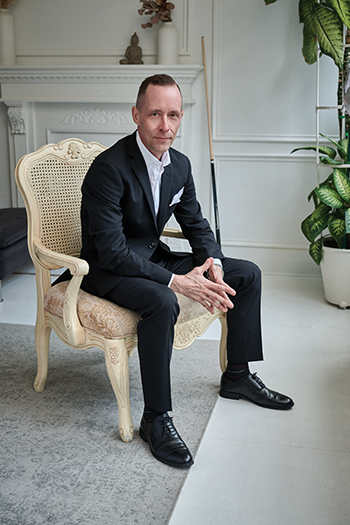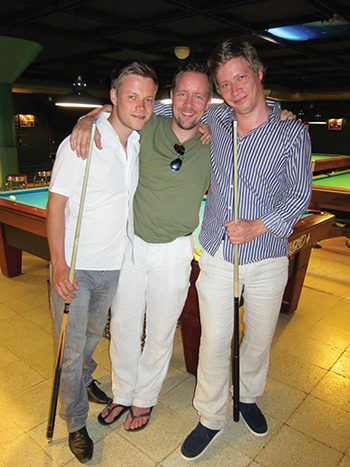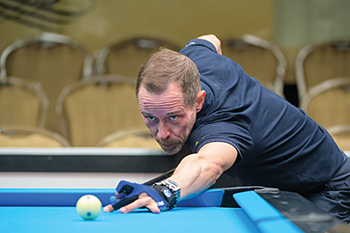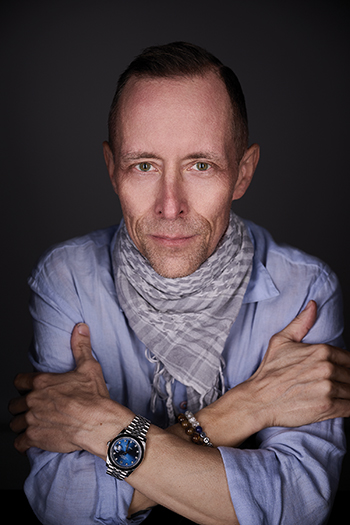


 |
 |
 |
| HomeAbout Billiards DigestContact UsArchiveAll About PoolEquipmentOur AdvertisersLinks |
|
Browse Features
Tips & InstructionAsk Jeanette Lee Blogs/Columns Stroke of Genius 30 Over 30 Untold Stories Pool on TV Event Calendar Power Index |
Current Issue
“Zero Give-Up In Me.” Hall of Famer Mika Immonen is facing cancer with the same grit and strength with which he overcame challenges on the table. By Michael P. Geffner The wound is the place where the Light enters you — Rumi This is what fighting for your life looks like. It is a Wednesday night in early June, and one of the greatest pool players of his generation is in the very last place he wants to be: cooped up in a hospital room on the 16th floor, 1618-B, at the famed Memorial Sloan Kettering Cancer Center in Manhattan. Amid monitors tracking his vital signs and maddening low beeps from an electrocardiogram, Mika Immonen, 52, aka The Iceman, diagnosed with Stage 4 colorectal cancer in December 2023, is resting in bed after a particular tough day, one that began with him being rushed in the morning to the emergency room with extreme exhaustion, difficulties breathing, and problems swallowing. A CT scan, followed by an endoscopy would later reveal why food was getting stuck in his throat. It is something disturbingly new, something quite concerning, another setback in this dark, treacherous, unpredictable adventure — a malignant, fast-growing mass, around six inches long, one inch wide — “like a noodle,” he says — in his esophagus. “Life is throwing lemons at me right now,” he says in that flat, clipped way of his. “I hope it's easy come, easy go.” This has been Immonen's turbulent existence for a year and a half. It is a life of never-ending scans and biopsies and chemotherapy and EKGs and morphine and saline drips and vomiting and sudden trips to the ER and radiation and hospital stays and oxygen tanks and steroids and bloodwork and oncologist appointments and updated prognoses and pain and more pain and scary days that dishearten him to no end and days he is flushed with the exhilaration that at last he is beating this thing. To the astonishment of those around him, Immonen seems to have kept his head when others would have certainly cracked, has maintained an outward calm and that dry sense of humor. Sure, he has his down days when he wants to find peace by shutting out the world and not saying a word. Days that he is not in a good mood. It is understandable. But eventually, relentlessly, his optimism pushes to the surface.  (Photo by Larry Busacca) Whether it is a strong front or just plain denial or the fact that he truly believes he can defy the odds, Mika pulls it off. He calls his cancer, dismissively, with a chuckle now, that “little invader” and “loser,” an ugly, unwanted, pesty thing he is determined to “push out” of his body. “It's on its way out,” he says. “It's definitely going.” And the way he says it, it is hard not to be convinced. He sees himself as a warrior in battle, going so far as to recently post an AI picture of himself as a fierce-looking samurai in the forest, decked out in a dark green kimono, sword at the ready, as his Facebook profile picture. “Dealing with this thing is a mindset,” he says. “Staying focused. Doing what I need to do to keep my body healthy, my mind strong. Doing whatever I need to do to beat this thing. Getting into war mode. Mind over matter, you know.” He summons, too, the fighting spirit of his Finnish roots, the concept of Sisu — a combination of perseverance, resilience and courage, going above and beyond ordinary willpower to push through the most extreme of challenges. He sometimes uses the phrase “full of Sisu” to sign off on social media posts. It is a message to his friends, family and fans, if not to himself, that he is not to be pitied, he does not want your pity, that he is perfectly okay, that he's got this, bro, and fighting this cancer with all his might. “There's zero give-up in me,” he says. And again, you cannot help but believe him. “This is like the greatest tournament I've ever entered,” he says. “And I'm going there to win, not to place 2nd.” He pauses for a beat, then adds without a smidgen of uncertainty: “The cancer will come in 2nd.” Mika's fight to survive at this moment looks like this: countless tangled wires and an IV drip behind him, small, adhesive electrode pads stuck to his arms and chest, a tube shoved up his nostrils to pump him with oxygen. It is a disconcerting sight. He is wearing glasses, a black baseball cap, and a sleeveless gray T-shirt (revealing a large tattoo down his right shoulder of his “inspirational” late grandmother, Riitta, a pioneering fashion designer in Finland). Under his shirt, along the left pec, there is the circular lump of a chemo port — a small, surgically implanted device to seamlessly administer chemotherapy and other medications, as well as to draw blood. His face, a bit wan, gaunt from 25 pounds of weight loss, says it all: an expression that is part fatigue, part defiance, and a whole lot of tamped-down I've-had-it-with-all-these tests, I'm-ready-to-climb-the-walls, how-the-hell-can-I get-out-of-here? desperation. He wants to be anywhere but here. Anywhere. For God's sake, please, anywhere but here. A lapse in his chemotherapy because of green card issues landed Mika in the hospital the previous week for five days, over the Memorial Day weekend. After returning from a flight to China, he was so exhausted he could hardly walk. “I was dragging my feet,” he says. He gasped for breath, had severe coughing fits. There was pain in his lower back, in his left thigh. And he would come to learn later that his oxygen levels were so low and his cardiac enzyme levels so high he was heading toward a heart attack; emergency medical treatment pulled him back from the brink. He knows he dodged something bad, if not life-threatening. In those few days in the hospital, he was evaluated to see if he could begin another round of chemotherapy, undergoing every test imaginable… X-ray of his lungs CT scan of his thigh A Special EKG MRI of his spine MRI of his thigh and pelvis Ultrasound of his lower extremities and heart CT scan of his lungs Cardiac MRI CT scan of his heart It was enough to break anyone's spirit. “But I refuse to cave in and be a patient,” he says. “There are a lot of days I don't want to get out of bed, but I force myself to get up and keep moving.” This is what fighting for your life looks like.  An AI-generated image of Immonen as a samurai ready for battle symbolizes his Finnish fighting spirit. “This latest scare was a reality check for him,” says close friend Emily Keaty, who Mika dated for five years from 2013 to 2018. Keaty has become his guardian angel. An acupuncturist living in Louisiana, she traveled to Costa Rica when Mika was first diagnosed, seeing him in person for the first time in years. As much as she can afford to be away from her practice and visit New York City, she continues to be by his side, comforting him, easing his pain with acupuncture, in and out of the hospital. “She is a rock,” he says. “She keeps me sane. Keeps me going. Watches over the drugs the doctors are giving me. It has made me more alert of what medication I'm getting. If not for her, I think I would be in hospice right now.” “He's handling his situation so valiantly,” Keaty says. “Mika is a very optimistic, strong person. He is taking this super positively. He sees himself as a hero. That's his personality. No matter what, Mika will fix any problem.” Keaty is touched by Mika's nurturing side especially under these circumstances. “It's funny, with all that he's going through, sitting in a hospital bed, he seems more concerned about what I need, my well-being, than his own.” Those close to Mika will tell you that he is not the same man as he was pre-cancer. That he is decidedly more empathetic, more patient, more attentive. He looks you in the eyes when he talks to you now, they say. He listens. He cares about what you have to say. He is in the moment with you. If anything good has come out of this, it is this: He is a better man. This is what fighting for your life does to you. It transforms you whether you know it or not. His nightmare got even worse this past April, when his twin brother Kari suddenly died. The call with the news came from Finland, from his mother Laura. The usually stoic Mika broke down in a way he never has before. A total gut punch. He cried like crazy all through the day for days on end and still cries every time he talks, or even thinks, about Kari, to where he cannot even utter a word for a minute at a time, completely overwhelmed with emotion, which oddly he does not do when he talks about himself and his cancer. “I'll take this cancer every day of the week if I could get my brother back,” he says. Kari was a gifted pool player as well. He could run 100 balls in straight pool, centuries in snooker. “Some say he was a more talented player than me,” Mika says, stopping to sob again. Mika had a dream about his brother the other day. It shook him to his core. In the dream, Kari was 10 years old, Mika the age he is now. “I asked him to come toward me, to hug me,” he says. “I broke down crying. It was so real. Then I woke up. Part of me didn't want to wake up from that dream. It felt so good to hug that innocent child.” He weeps through this entire recollection. He flew out to the funeral in Finland. “It was a beautiful funeral,” he says. On his Facebook page, he wrote: “My twin, rest in peace… love you eternally.” “Losing my brother was definitely the lowest point of my life,” he says. “We had an unbelievable bond.” The pain seems so deep, triggered so easily, so instantly, you wonder if Mika will ever get over this. His grief seems to border on trauma.  The sudden loss of twin brother Kari (right) hit Mika harder than his cancer diagnosis. Mika's life upended for good in November 2023, while playing in the All-Japan Championship. He began feeling excruciating pain in his lower back and pelvis. He could not sleep. He was losing weight rapidly, suffered from dehydration, and for the longest time, was experiencing both constipation and uncontrollable bouts of diarrhea, to where he needed to run to the bathroom several times during matches. Despite all that, he, amazingly, kept playing and finished a miraculous 4th. “I was in no shape to play, but I didn't want to let down my fans and my sponsor,” he says. “The way I fought into the quarterfinals will go down in my mind as one of my greatest achievements.” Around a month later, in Costa Rica, after he and his doctors dismissed his rectal pain as mere hemorrhoids for too long, Mika finally checked into a hospital for tests. The news could not have been worse, more startling, devastating: diagnosed with Stage 4 colorectal cancer — a large 10-inch rectal tumor that metastasized to his colon, lungs, back, and hip socket, and painfully hitting nerves. He immediately underwent aggressive chemo, something called FOLFOX — a combination of three powerful drugs. “He was scared,” remembers Keaty, who flew out to Costa Rica immediately to be by his side. His only solace was that the doctors told him his cancer responds well to chemo. On his Facebook page, he posted: “Dear friends, fans, and members of the billiard industry….With much shock to even myself, I am withdrawing from any foreseeable tournaments as I will be fighting the greatest match of my life…I love this game, I love this community, and I love my fans. I cannot wait to join you all again on the table…full of life.” “The strange thing is, I was never really sick before,” he says now, still in utter disbelief of how he reached this point. Mika always seemed indestructible. Impenetrable. Supremely untouched by things around him. It is what built his iconic Iceman persona. He was always fit, worked out in the gym, ran, looked good. How could this possibly be happening to him? Of all people. At such a young age. With medical costs quickly mounting past affordability, a GoFundMe campaign was created with a goal of $50K. It was hashtagged #IceManStrong, along with a blue ice cube with a pumped fist inside it. He reached his goal in less than 24 hours and eventually broke $100K before it ended. Fellow BCA Hall of Famer Jeanette Lee, who is going through her own battle with Stage 4 ovarian cancer, was another who traveled to Costa Rica to offer emotional support. Lee made a $10k donation. “Which blew my mind,” Mika says. “She really went out of her way. I was speechless.” Raising all that money, he says, “was such a morale booster. It validated my impact on people, on the sport. It told me how much people cared about me. I felt the love. Even from those I had riffs with in the past.” After around a four-month hiatus from playing, Mika was feeling well enough to make plans again to sign up for a tournament. To make sure he was ok, he proceeded to undergo a colonoscopy and a PET scan (a radioactive tracer to visualize and assess how his body's tissues and organs were functioning) — and he cleared both tests. His prayers were answered. It was a long-awaited time of jump-up-in-the-air celebration. He was in remission — or so he was convinced at the time. “I was over the moon,” he says. “I felt like Superman.” He pauses, his voice dropping. “In hindsight,” he adds, “I was delusional.” Sure enough, by as soon as July, the cancer came back — and stronger. “That second diagnosis hit me harder than the first,” he says. “I was too relaxed. I'm a hedonist and I went back to doing my old stuff. Like drinking too much. I wanted to start living again. But after that second diagnosis, I knew I had to change my bad habits, my mind chemistry. There are things I just can't do anymore.” Hence, the birth of Mika 2.0: a cleaner-living version, entirely focused on his health. “I knew it was time to get to work,” he says. He changed his diet completely — swore off alcohol and sugar, bread and pasta. He switched to mostly nutrient-dense, plant-based foods, accompanied by intermittent fasting, and included things like Chinese herbs and juicing, ice baths and yoga, holistic healing and acupuncture and Quantum physics. “I'm open to anything that helps me fight this thing,” he says. “I want to give my body every chance possible.” His life now is more steeped in the “power of now.” Pause. Reflect. Appreciate. That's his mantra. Taking nothing for granted. Living every day meaningfully.  Farrell and Keaty have been at Immonen's side throughout his ordeal, advocating for him while he maintains his fighting spirit. Bradley Farrell, an amateur pool player, has been one of Mika's closest friends for the last nine years. Farrell owned a vintage-cars auction house before retiring in his 40s (he is 50 now). They both live in Manhattan and see each other often. They walk around Central Park South, have dinners, watch movies in one or the other's apartment. In a striking coincidence, Farrell was diagnosed with colorectal cancer as well, in 2014, but Stage 1 that never spread. He knew the warning signs well. “When Mika first started showing symptoms, I urged him to get it checked out,” says Farrell. “He never did. I think he kinda wanted to wish it away. Like even now, I've asked him a hundred times if he realizes the severity of his situation. He says yes, but I'm not sure I believe him. Maybe that's the trick that could prolong his life. His state of mind could not be more positive.” It is a desperately hot day in New York City, topping 100 degrees at one point. Mika has been out of the hospital for a couple of weeks now, after completing his 30th round of chemo. His 31st round would come weeks later. And there will be many more rounds to come. “My life,” he says of the tenuous nature of his cancer journey, “is scan to scan.” He looks exceedingly happier than last time, and particularly summery and stylish: cream-colored satin fedora, big brown-rimmed glasses, navy blue Ralph Lauren U.S. Open (tennis) T-shirt and beige shorts. He looks vibrant, alive. He is not even sweating in this hellish heat. He is in a back booth of an Asian dumpling house only blocks from his Riverside apartment on West 72nd Street eating lunch. Using chopsticks and a chirirenge (a small, ladle-like Japanese spoon), he is slurping down pork dumpling soup with edamame on the side and ginger dipping sauce. “Ginger and edamame are healthy,” he says. His drink of choice: green tea. “It's a great antioxidant,” he says. This, of course, is Mika 2.0 to a T. Anything healthy rules. We all know who Mika used to be. He was a beast. In the 2000s, with his incredible firepower and stone-faced concentration (as well as his famously explosive temper), he was a threat to win any tournament he entered. He won two World Championships, two U.S. Open Championships, two International Challenge of Champions titles, and dozens upon dozens of other wins all over the world. All leading to his easy induction into the Billiards Congress of America Hall of Fame in 2014. The memory that stands out most for Immonen is his defense of the U.S. Open in 2009, coming back from a second round loss to win a U.S. Open record 14 matches in a row, concluding with a 13-10 victory over Ralf Souquet in the final. “That record,” he says, “will never be broken.” And you can hear the pride in his voice.  Immonen, who hopes to play in the U.S. Open, says playing is a “great distraction” for him. It is the greatest example of him fighting against the heavy odds, under intense pressure, and coming out on top. “I've always been a great come-from-behind player,” he says with a smile, hinting for you to make the connection to his current condition. Mika has accepted the fact that he will never be that player again. “I don't have the same stamina, drive, that sustained crazy ultra focus,” he says. “I'm also getting older. I mean, I still have flashbacks (like beating Joshua Filler in Puerto Rico last December), but not for several matches in a row.” He still wants to play professional tournaments, no matter what the results. Pool is in his DNA, he says, as is the intense preparation, getting in the middle of the arena and competing hard. He loves the whole process. Plus, he truly needs it now more than ever. “It's a great distraction for me,” he says. “It pulls me away from thinking about my illness all the time.” Chemo has shrunk the mass in his esophagus, making it go away as quickly as it came — yet another major crisis averted. But he faces the immovable reality that the five-year survival rate for people with Stage 4 colon cancer is about 13%. You sense that Mika is either oblivious to the odds or he simply does not care or, in his mind, he has no doubt whatsoever that he will be part of that tiny 13%. His optimism is unshakeable, his fight strong. He is looking nowhere but forward, to a long future, he says. He is excited about being a part of the launch of a couple of businesses — the innovative billiard chalk company Taom and a logoed merch company called Shadowtight (a term born from checking the tightness of a rack of balls). And he is planning on playing in the 48th U.S. Open Pool Championship in August at Harrah's Resort in Atlantic City. He is keeping the promise he made to himself a long time ago: No matter how he feels, he must continue to get up every day and keep moving. Just keep moving. If he is moving, he is not dying. This is what fighting for your life looks like. It is not pretty. It is not for the weak-minded. It tests you daily. It is the ultimate mind game, where you face your mortality head on and find out how mentally tough you really are. It is a time where the Finn in him must summon the Sisu gods.  Immonen has made a promise to himself to “get up every day.” (Photo by Larry Busacca) Mika will look you squarely in the eyes and tell you, without hesitation, that, yes, he is definitely full of Sisu. No give-up whatsoever. Cancer, that little invader, that loser, be damned. “I have a strong will to live,” he says. “I don't want to die.” Like the Rumi poem, his “wound,” has led him to the “light” of a transformation. He sees the world as something bigger than himself now. His fight is the fight of everyone facing horrific disease. There is an opportunity here for a greater good. He takes a sip of his tea full of antioxidants. “I hope I beat this thing,” he says matter-of-factly, his eyes steady and in the moment, “If I beat it, I know that I will inspire a lot of people.” |
Since 1978, Billiards Digest magazine has been the pool world’s best source for news, tournament coverage, player profiles, bold editorials, and advice on how to play pool. Our instructors include superstars Nick Varner and Jeanette Lee. Every issue features the pool accessories and equipment you love — pool cues, pool tables, instruction aids and more. Columnists Mike Shamos and R.A. Dyer examine legends like Willie Mosconi and Minnesota Fats, and dig deep into the histories of pool games like 8-ball, 9-ball and straight pool.
Copyright © 1997 - 2025 Billiards Digest
All Rights Reserved
Luby Publishing, Inc.
310 Busse Highway PBM #319 | Park Ridge, IL 60068
Phone: 312-341-1110 | Fax: 312-341-1469